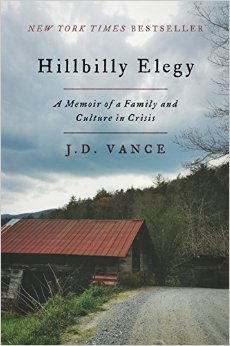
by J.D. Vance
The book of the moment is JD Vance’s memoir Hillbilly Elegy, currently residing at #1 on the New York Times bestseller list.
Vance’s story has hit a nerve by providing a compelling lens through which those appalled by the popularity of Donald Trump in working-class circles can understand his improbable rise. Who are these Trump voters? Vance, a son of Appalachian hillbillies who ended up graduating from Yale Law and now works for a Peter Thiel founded investment fund in San Francisco, says they are his people. By telling his story he hopes to help us understand them. And to understand that while they have suffered external economic blows, ultimately their inability to respond positively to them is a result of their own failed culture.
The book is a fantastic read and highly recommended. But I find it puzzling that this book has so received so many positive reviews and so little substantive critique in light of its flaws and limitations. To remedy that I wrote a long review of the book that is now online at City Journal called “Culture, Circumstance, Agency.” In it I recognize the virtues of Vance’s account, but also take him to task in some areas. Here is an excerpt:
He then applies to and is accepted at Yale Law School, where the cultural gulf between his hillbilly upbringing and the American elite first comes into full relief. He discovers the role that social capital, mentors, and connections play in success. One of his professors at Yale, Amy Chua, of Tiger Mom fame, becomes a key advisor and advocate for him. He struggles in settings upper middle class students would navigate with ease. He spits out sparkling water in disgust and surprise the first time he drinks it. When a law firm takes him to an upscale restaurant for dinner, he has to call Usha, then his girlfriend, to ask how to use the silverware. At Yale, he discovers that he must not just reject the toxic elements of his old culture but also embrace this new one to get anywhere.
The social deficiencies of the working class are under-appreciated by those who never suffered them. I also came from a working-class background. After flying to a job interview in Chicago in college, I didn’t know how to take a taxi and was too ashamed to ask. I tried getting in a cab dropping off passengers; the driver was kind enough to tell me where the cabstand was without humiliating me. I didn’t know how to use chopsticks. I didn’t know the way much of the professional world functioned. And a lot of those things I didn’t know that I didn’t know. I estimate that I started out five to 10 years behind those who came from upper middle class homes in important ways. I’ve heard the same from others of similar origins.
E.D. Hirsch talks about the “core knowledge” every kid must learn. For those with above-average intelligence, knowledge is relatively easy to acquire if you don’t have it. But there’s also a set of core social knowledge and experiences needed to function effectively in educated society. This can be more challenging to obtain, especially without a mentor. Vance illuminates this oft-overlooked aspect of upward mobility.
Click through to read the whole thing.
I have a number of further observations on Vance and this book that I may put up in a follow-up blog post.
Homepage cover image via City Journal
from Aaron M. Renn
http://www.urbanophile.com/2016/08/23/hillbilly-elegy-jd-vance-culture-circumstance-agency/
No comments:
Post a Comment